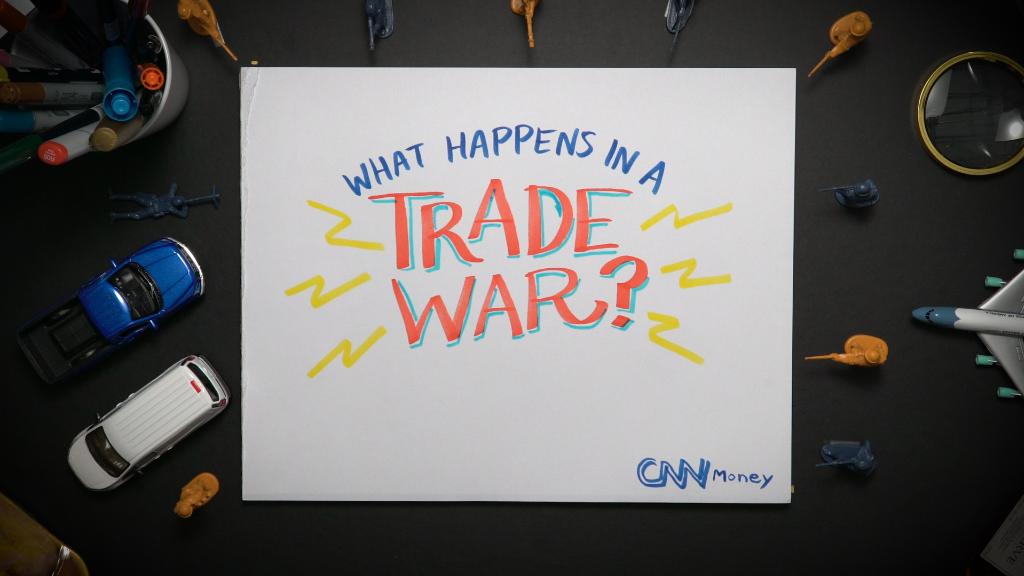
Trade war fears and a presidential attack on Amazon rocked Wall Street.
The Dow closed down 459 points on Monday. The Nasdaq plunged almost 3% and dropped into the red for the year. Heavy selling in tech stocks left the Nasdaq just shy of correction territory, 10% below its all-time closing high.
At one point, the Dow was down as much as 758 points, a brutal first day of trading for the second quarter of 2018. Market analysts blamed the sell-off on concerns about trade tensions and President Trump's attacks on Amazon.
Amazon (AMZN), one of the biggest drivers of the 2017 market rally, tumbled 5%, wiping out more than $36 billion of its market value.
Trump once again accused Amazon of taking advantage of the US Postal Service, and he suggested that Amazon does not pay its fair share of tax.
In fact, Amazon pays the same lower rate that the post office charges other bulk shippers, and it collects sales tax in every state that charges it. Amazon does not collect sales tax on purchases made from third-party vendors.
Related: Trump isn't as pro-business as he claims
"You've got the president of the United States attacking a single company over what he considers to be unfair practices," said Ian Winer, head of equities at Wedbush Securities.
Amazon wasn't the only tech stock in trouble. Tesla (TSLA), Netflix (NFLX) and Cisco (CSCO) all dropped by at least 4%. Intel (INTC) plunged 6% on a Bloomberg News report that Apple plans to switch to its own chips. Almost every stock in the Nasdaq 100 lost ground.
"When investors see market leaders suddenly stumble, they become more cautious about the entire group," said Kate Warne, investment strategist at Edward Jones.
The selling spread to Asia, where benchmark indexes in Tokyo, Hong Kong and Shanghai all fell around 1% on Tuesday morning.
Related: Trump vs. Amazon: Let's set the record straight
Wall Street is also fretting about rising trade tensions, especially with China. Beijing responded to Trump's steel and aluminum tariffs on Monday by following through on its threat to impose tariffs on $3 billion of US imports. The tariffs apply to 128 products, ranging from pork and meat to steel pipes.
Trump plans to place additional tariffs on about $50 billion worth of Chinese goods — and Beijing has promised to respond.
John Toohey, head of equities at USAA, blamed the sell-off on concerns about the China tariffs. "Global trade could slow down, global supply chains could be impacted, and CEOs could be more cautious on capital spending," Toohey said.
NAFTA worries are also on the rise after Trump took aim at the trade deal between the United States, Canada and Mexico. Trump on Sunday linked NAFTA to his efforts to build a wall along the border with Mexico.
"They must stop the big drug and people flows, or I will stop their cash cow, NAFTA. NEED WALL!" Trump tweeted.
"It's a cause for concern. That mixing of issues is contributing to uncertainty," said Kristina Hooper, chief global market strategist at Invesco.
Related: Trump's attacks on Amazon are working
No matter the cause, signs of fear abounded. The VIX (VIX) volatility index jumped more than 15%. CNNMoney's Fear & Greed Index of market sentiment dropped further into "extreme fear." Crude oil plunged about 3%. Gold, which tends to do well when investors are worried, climbed more than 1%.
"None of it makes a lot of sense," said Michael Block, chief strategist at Rhino Trading Partners. "I don't know what we learned that was new. Chinese tariffs are not surprising."
After spiking last year, the stock market hit extreme turbulence during the first three months of the year as investors worried about tariffs, inflation and tech stocks. The Dow snapped its longest quarterly winning streak in 20 years.
Stocks may be volatile, but the backdrop looks bright. Global economic growth is expected to accelerate and corporate profits are likely to surge, thanks in part to Trump's corporate tax cuts.
"It's unlikely to be the end of the bull market," Warne said. "The underlying fundamentals remain positive."


